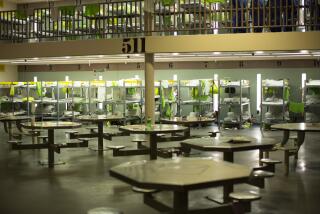Deputies Described as Corrupt : Trial: The prosecutor says seven law enforcement officers turned the drug war into their own personal piggy banks.
- Share via
Seven Los Angeles County sheriff’s deputies, accused of skimming more than $1.4 million during narcotics raids, were portrayed by a prosecutor Tuesday as corrupt officers who “turned the war on drugs into their own personal piggy banks” and used stolen drug cash for spending sprees.
The officers--who worked together on an elite narcotics investigation team--stole huge sums of money from drug traffickers and money launderers to finance cars, boats, vacation homes and other luxuries, Assistant U.S. Atty. Jeffrey C. Eglash told jurors in Los Angeles federal court.
The prosecutor described the defendants as veteran deputies who had sworn to uphold the law but, in the end, “flaunted the law” by succumbing to the temptation of drug money.
The evidence “has established one terrible, but indisputable, fact: The narcotics officers . . . were a group of corrupt, dishonest thieves,” Eglash said in his closing statement in the seven-week trial.
“(They were) thieves who turned the war on drugs into their own personal piggy banks from which they could satisfy their greed,” he added.
Eglash’s statement came as both prosecutors and defense attorneys began final arguments before the jury.
The seven deputies, who were suspended last year in the worst corruption scandal to hit the Sheriff’s Department in recent history, are accused of a variety of charges--including conspiracy, theft, tax evasion, money laundering and extortion.
Six defendants--Deputies Terrell H. Amers, James R. Bauder, Eufrasio G. Cortez, Ronald E. Daub, John C. Dickenson and Daniel M. Garner--had worked together on the team, known as Majors II, while defendant Macario M. Duran worked as an undercover officer on another elite investigative team known as Majors III. All have maintained their innocence.
And attorney James Riddet, who represents Cortez, told jurors Tuesday that they should vote for acquittal because the federal government has failed to prove its case beyond a reasonable doubt.
“When you review the evidence, there’s not just reasonable doubt but overwhelming doubt whether any of these defendants committed a crime,” Riddet said.
As the first defense attorney to make a closing statement, Riddet attacked the prosecution’s case as one built on the testimony of admitted drug dealers, incomplete financial information and dependent upon one witness, the defendants’ former boss, Robert R. Sobel.
Calling the former sheriff’s sergeant the key to the government’s case, Riddet argued that Sobel--who has already pleaded guilty to conspiracy and tax evasion--was an admitted liar and thief who has falsely accused his former subordinates to save himself from a lengthy prison term.
“When we talk about Robert Sobel, we are talking about a person who is morally bankrupt,” Riddet said.
While Eglash acknowledged that Sobel was “a corrupt cop,” he said the former sergeant was truthful in describing how he and his deputies stole money on more than 20 drug raids during 1988 and 1989. And he argued that the prosecution’s case went beyond Sobel’s testimony.
Eglash said that a videotape of an FBI sting showed deputies stealing money and that the prosecution also presented bank records, sales receipts, income tax returns and other financial documents that disclosed how deputies spent money well beyond their sheriff’s salaries--and conducted many of those transactions in cash.
“There’s only one question left to answer,” the prosecutor told the jury. “Where did all this money come from and how did all these members of Majors II get so rich?”
More to Read
Sign up for Essential California
The most important California stories and recommendations in your inbox every morning.
You may occasionally receive promotional content from the Los Angeles Times.













